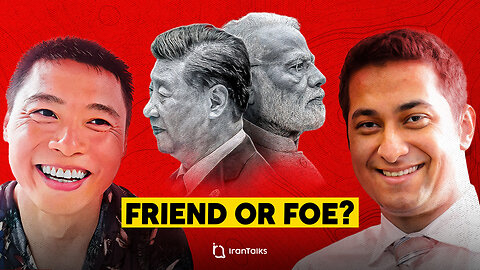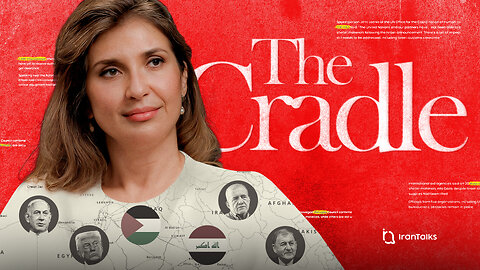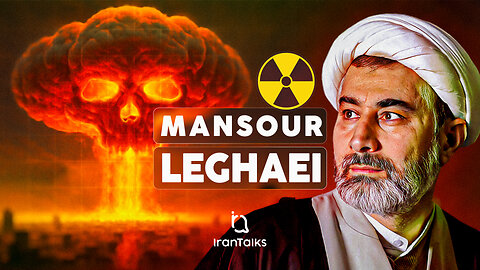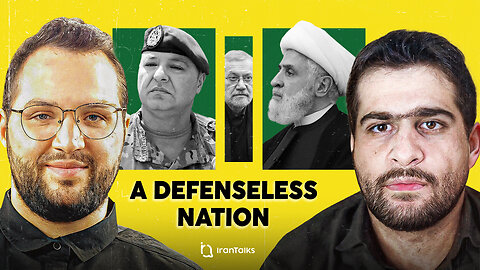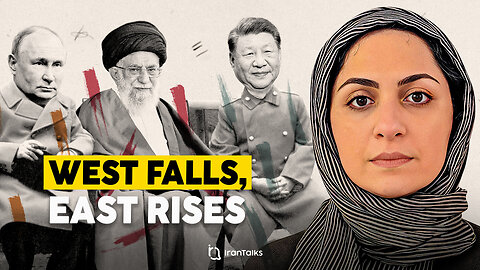
-
Did the West's War on Iran Accelerate a New World Order | Sara Larijani
 The IranTalksThe recent US-Israeli imposed war on Iran was a gamble for regime change that has dramatically backfired. In this incisive interview, we are joined by Dr. Sara Larajani, a distinguished researcher from the University of Tehran, to analyze the stunning aftermath of the Iran-Israel conflict. 00:00 Introduction 03:34 The Decline of US Global Dominance 06:50 US Diplomacy Exposed: Negotiations as a Smokescreen for War 09:50 The UN's Weakened Position and European Double Standards 16:35 Iran Suspends IAEA Cooperation Over Leaked Secrets 20:39 Israel's Unmonitored Nuclear Arsenal vs Iran's Program 23:52 Iran's Military Response Shatters Israel's Invincibility Myth 28:19 Israeli Attack Backfires, Creating Internal Unity in Iran 31:53 Historical Context of Iranian Resistance to Foreign Invaders 34:57 Western-Backed Opposition Commits Political Suicide 38:11 Rise of a Multipolar World: Iran, China, and Russia 41:31 Future Predictions for West Asia and Global Powers What were the true objectives of the 12-day imposed war, and why did they fail so spectacularly? Dr. Larajani explains how the aggression, far from causing internal unrest, united the Iranian people and strengthened the state. We delve deep into the blatant Western hypocrisy, where international laws were ignored to protect an aggressor, shattering the credibility of institutions like the UN and IAEA. This discussion also explores how Iran's powerful military retaliation completely shattered the myth of Israeli invulnerability, revealing critical flaws in its expensive, Western-backed defense systems. Most importantly, we examine the accelerated decline of US global dominance. This conflict has undeniably pushed Iran into a closer, more comprehensive alliance with Russia and China, signaling a definitive shift toward a multipolar world order. Join us as we unpack the geopolitical shifts, the erosion of Western diplomacy, and the new reality of power in the Middle East. Don't forget to like, subscribe, and hit the notification bell for more deep-dive analysis on Iran and West Asia!15 views
The IranTalksThe recent US-Israeli imposed war on Iran was a gamble for regime change that has dramatically backfired. In this incisive interview, we are joined by Dr. Sara Larajani, a distinguished researcher from the University of Tehran, to analyze the stunning aftermath of the Iran-Israel conflict. 00:00 Introduction 03:34 The Decline of US Global Dominance 06:50 US Diplomacy Exposed: Negotiations as a Smokescreen for War 09:50 The UN's Weakened Position and European Double Standards 16:35 Iran Suspends IAEA Cooperation Over Leaked Secrets 20:39 Israel's Unmonitored Nuclear Arsenal vs Iran's Program 23:52 Iran's Military Response Shatters Israel's Invincibility Myth 28:19 Israeli Attack Backfires, Creating Internal Unity in Iran 31:53 Historical Context of Iranian Resistance to Foreign Invaders 34:57 Western-Backed Opposition Commits Political Suicide 38:11 Rise of a Multipolar World: Iran, China, and Russia 41:31 Future Predictions for West Asia and Global Powers What were the true objectives of the 12-day imposed war, and why did they fail so spectacularly? Dr. Larajani explains how the aggression, far from causing internal unrest, united the Iranian people and strengthened the state. We delve deep into the blatant Western hypocrisy, where international laws were ignored to protect an aggressor, shattering the credibility of institutions like the UN and IAEA. This discussion also explores how Iran's powerful military retaliation completely shattered the myth of Israeli invulnerability, revealing critical flaws in its expensive, Western-backed defense systems. Most importantly, we examine the accelerated decline of US global dominance. This conflict has undeniably pushed Iran into a closer, more comprehensive alliance with Russia and China, signaling a definitive shift toward a multipolar world order. Join us as we unpack the geopolitical shifts, the erosion of Western diplomacy, and the new reality of power in the Middle East. Don't forget to like, subscribe, and hit the notification bell for more deep-dive analysis on Iran and West Asia!15 views -
China’s Role in U.S.-Israel-Iran Confrontation | Carl Zha, Elijah Magnier & Lee Camp
 The IranTalksIn this powerhouse discussion on Irantalks, we're joined by renowned experts Elijah Magnier, Carl Zha, and Lee Camp to dissect one of the most critical questions of our time: What was China's real role during the recent Iran-Israel war? 00:00 Introduction to the Project 03:44 US-Israel Empire vs. China's Peaceful Policy 08:24 China-Iran Military and Energy Cooperation 13:20 US Proxy War Strategy: From Ukraine to Taiwan 18:28 Strait of Hormuz: How China Would React to a Longer War 24:10 BRICS and De-Dollarization: China's Economic Strategy 29:53 US Military's Reliance on Chinese Rare Earth Minerals 34:36 China's Business-First Foreign Policy vs. US Pillaging 39:11 China Defies US Unilateral Sanctions on Iran 49:11 Was the China-Iran Railway a Motive for the Attack? 52:47 Existential War: The Strait of Hormuz Blockade Explained While Beijing condemned the aggression, it officially remained on the sidelines. But was this a calculated move in the great game of US China rivalry, or a missed opportunity to act as a global leader? Our guests dive deep into China's foreign policy, debating the strategic thinking in Beijing. We explore the red lines that might have forced China's hand, particularly the threat to its energy supplies passing through the vital Strait of Hormuz. This conversation goes beyond the headlines to analyze the future of China Iran relations. Will the conflict push Tehran and Beijing into a deeper military and security alliance? Or will China cautiously protect its economic interests, like the Belt and Road Initiative, while avoiding a war with the US? Join us for an in-depth analysis of the shifting Middle East geopolitics and whether China is poised to replace American influence in the region. Don't forget to like, subscribe, and hit the notification bell for more essential insights into Iranian and West Asian affairs!22 views
The IranTalksIn this powerhouse discussion on Irantalks, we're joined by renowned experts Elijah Magnier, Carl Zha, and Lee Camp to dissect one of the most critical questions of our time: What was China's real role during the recent Iran-Israel war? 00:00 Introduction to the Project 03:44 US-Israel Empire vs. China's Peaceful Policy 08:24 China-Iran Military and Energy Cooperation 13:20 US Proxy War Strategy: From Ukraine to Taiwan 18:28 Strait of Hormuz: How China Would React to a Longer War 24:10 BRICS and De-Dollarization: China's Economic Strategy 29:53 US Military's Reliance on Chinese Rare Earth Minerals 34:36 China's Business-First Foreign Policy vs. US Pillaging 39:11 China Defies US Unilateral Sanctions on Iran 49:11 Was the China-Iran Railway a Motive for the Attack? 52:47 Existential War: The Strait of Hormuz Blockade Explained While Beijing condemned the aggression, it officially remained on the sidelines. But was this a calculated move in the great game of US China rivalry, or a missed opportunity to act as a global leader? Our guests dive deep into China's foreign policy, debating the strategic thinking in Beijing. We explore the red lines that might have forced China's hand, particularly the threat to its energy supplies passing through the vital Strait of Hormuz. This conversation goes beyond the headlines to analyze the future of China Iran relations. Will the conflict push Tehran and Beijing into a deeper military and security alliance? Or will China cautiously protect its economic interests, like the Belt and Road Initiative, while avoiding a war with the US? Join us for an in-depth analysis of the shifting Middle East geopolitics and whether China is poised to replace American influence in the region. Don't forget to like, subscribe, and hit the notification bell for more essential insights into Iranian and West Asian affairs!22 views -
China & India: Balancing Alliances or Betraying Iran? | Alok Arora & Carl Zha
 The IranTalksIn the wake of the recent Iran-Israel war, the geopolitical landscape of the Middle East is more complex than ever. While Iran's membership in organizations like BRICS was meant to build a united front, has it instead led to a strategic dead end? In this critical debate, we explore whether Iran has been betrayed by its Eastern partners, China and India. 00:00 Intro 01:47 Can BRICS Become a Security Alliance to Counter NATO? 08:07 Is India the Weak Link in the BRICS Alliance? 15:39 US Economic Pressure vs. China's Belt and Road Initiative 19:08 IMEC: Why is Iran Excluded from the India-Europe Corridor? 28:28 The Nuclear Question: Should Iran Develop a Deterrent? 33:20 Will India & China Bow to US Sanctions on Iranian Oil? 41:54 Sovereignty vs. Self-Interest: Why India Bends to the US 48:51 Iran-China vs. India-US: A Military Comparison 52:36 How Indian and Chinese Publics View the Iran-Israel Conflict Join us at Irantalks for an in-depth discussion with renowned experts Carl Zha, who breaks down China's foreign policy, and Alok Arora, who provides insight into India's strategic calculations. We analyze the rivalry between China's Belt and Road Initiative (BRI) and the US-backed IMEC, dive into the failure of the Shanghai Cooperation Organization (SCO) to act, and ask if Tehran is facing a new era of "participatory isolation." This is a must-watch analysis for anyone interested in the future of West Asia and the shifting global power dynamics. What are your thoughts? Let us know in the comments below! Don't forget to Like, Subscribe to Irantalks, and hit the notification bell for more expert insights on Iran & West Asia.14 views
The IranTalksIn the wake of the recent Iran-Israel war, the geopolitical landscape of the Middle East is more complex than ever. While Iran's membership in organizations like BRICS was meant to build a united front, has it instead led to a strategic dead end? In this critical debate, we explore whether Iran has been betrayed by its Eastern partners, China and India. 00:00 Intro 01:47 Can BRICS Become a Security Alliance to Counter NATO? 08:07 Is India the Weak Link in the BRICS Alliance? 15:39 US Economic Pressure vs. China's Belt and Road Initiative 19:08 IMEC: Why is Iran Excluded from the India-Europe Corridor? 28:28 The Nuclear Question: Should Iran Develop a Deterrent? 33:20 Will India & China Bow to US Sanctions on Iranian Oil? 41:54 Sovereignty vs. Self-Interest: Why India Bends to the US 48:51 Iran-China vs. India-US: A Military Comparison 52:36 How Indian and Chinese Publics View the Iran-Israel Conflict Join us at Irantalks for an in-depth discussion with renowned experts Carl Zha, who breaks down China's foreign policy, and Alok Arora, who provides insight into India's strategic calculations. We analyze the rivalry between China's Belt and Road Initiative (BRI) and the US-backed IMEC, dive into the failure of the Shanghai Cooperation Organization (SCO) to act, and ask if Tehran is facing a new era of "participatory isolation." This is a must-watch analysis for anyone interested in the future of West Asia and the shifting global power dynamics. What are your thoughts? Let us know in the comments below! Don't forget to Like, Subscribe to Irantalks, and hit the notification bell for more expert insights on Iran & West Asia.14 views -
Will the U.S. ignite an Iran–Israel war by destabilizing Iraq? | Sharmine Narwani
 The IranTalksA new wave of instability in Iraq could be the trigger for an even larger confrontation in West Asia. With Washington’s influence deeply entrenched in Baghdad, questions are being raised: is the U.S. deliberately trying to destabilize Iraq in order to ignite a direct Iran–Israel war? 00:00 Intro 01:43 What the Iran-Iraq Security Agreement Entails 07:23 Understanding the US Troop Withdrawal from Iraq 11:45 The US and UK's Enduring Agenda in the Region 15:55 How the US Controls Billions in Iraqi Oil Revenue 18:57 Israel's Declaration to Occupy Gaza and its Ramifications 25:28 The Collapse of the Western "Rules-Based Order" 30:15 Impact of the 12-Day War on Regional Power Dynamics 38:23 Iran's "Missile Math": A Game-Changing Military Advantage 45:53 Could Iran Launch a Preemptive Strike on Israel? In this critical discussion, we are joined by political analyst and Editor of The Cradle Sharmine Narwani to unpack the real motives behind U.S. policy in Iraq. We explore whether American interference is about maintaining control, protecting Israeli interests, or weakening Iran’s regional influence. How will Iraq’s fragile political landscape respond to this foreign meddling? Can Tehran afford to remain patient, or is direct confrontation with Israel becoming inevitable? And what role will regional resistance movements play if the U.S. succeeds in sparking chaos on Iran’s doorstep? Join the conversation and share your thoughts in the comments below! Is Iraq becoming the frontline in a broader U.S.-Israeli war against Iran? Don’t forget to like, subscribe, and hit the notification bell for more in-depth analysis on Iran & West Asia from IranTalks! #Iran #Iraq #Israel #USforeignpolicy #WestAsia #SharmineNarwani #Geopolitics #The Cradle #thecradlemedia #the cradle media15 views
The IranTalksA new wave of instability in Iraq could be the trigger for an even larger confrontation in West Asia. With Washington’s influence deeply entrenched in Baghdad, questions are being raised: is the U.S. deliberately trying to destabilize Iraq in order to ignite a direct Iran–Israel war? 00:00 Intro 01:43 What the Iran-Iraq Security Agreement Entails 07:23 Understanding the US Troop Withdrawal from Iraq 11:45 The US and UK's Enduring Agenda in the Region 15:55 How the US Controls Billions in Iraqi Oil Revenue 18:57 Israel's Declaration to Occupy Gaza and its Ramifications 25:28 The Collapse of the Western "Rules-Based Order" 30:15 Impact of the 12-Day War on Regional Power Dynamics 38:23 Iran's "Missile Math": A Game-Changing Military Advantage 45:53 Could Iran Launch a Preemptive Strike on Israel? In this critical discussion, we are joined by political analyst and Editor of The Cradle Sharmine Narwani to unpack the real motives behind U.S. policy in Iraq. We explore whether American interference is about maintaining control, protecting Israeli interests, or weakening Iran’s regional influence. How will Iraq’s fragile political landscape respond to this foreign meddling? Can Tehran afford to remain patient, or is direct confrontation with Israel becoming inevitable? And what role will regional resistance movements play if the U.S. succeeds in sparking chaos on Iran’s doorstep? Join the conversation and share your thoughts in the comments below! Is Iraq becoming the frontline in a broader U.S.-Israeli war against Iran? Don’t forget to like, subscribe, and hit the notification bell for more in-depth analysis on Iran & West Asia from IranTalks! #Iran #Iraq #Israel #USforeignpolicy #WestAsia #SharmineNarwani #Geopolitics #The Cradle #thecradlemedia #the cradle media15 views -
Iran's Nuclear Program: Is Ayatollah Khamenei's Religious Ban on Nukes Changeable?
 The IranTalksIs the religious decree forbidding nuclear weapons in Iran absolute, or could the escalating tensions from the war change everything? In this critical episode of Irantalks, we sit down with esteemed Islamic scholar Dr. Mansour Leghaei to get the definitive answers. 00:00 Introduction 01:42 Eyewitness Report from Isfahan 05:51 The Fatwa Forbidding Nuclear Weapons 12:20 Secondary Rulings & Precedents 22:12 The Obligation of Muslims Abroad 29:30 Analyzing the "Victory" Claims 32:20 Conclusion & Final Prayer We explore the core of Ayatollah Khamenei's famous nuclear fatwa. Why does the Supreme Leader, as a top jurist, consider the atom bomb to be "haram" (forbidden by God)? We unpack the specific religious reasoning behind this order and discuss whether his fatwas are considered binding law within the Islamic Republic's legal framework. With the geopolitical landscape of the Middle East shifting rapidly, many are asking: Is Iran secretly changing its nuclear policies? Dr. Leghaei provides his expert analysis on the conditions under which the Supreme Leader might be permitted by Islamic law to change this critical fatwa. Furthermore, we touch upon the sentiments of the people in cities like Isfahan, who live with the daily reality of a potential conflict. What are your thoughts? Can a religious decree hold firm against immense geopolitical pressure? Let us know in the comments below. Subscribe to our channel for daily updates and in-depth analysis of Iranian and Middle Eastern affairs. Follow us on social media for behind-the-scenes content and updates: X : https://x.com/theirantalks Telegram: http://t.me/iranscreenshot1 Instagram: instagram.com/theirantalks #Irantalks #NuclearFatwa #Khamenei #Iran #Geopolitics #ShiaIslam25 views
The IranTalksIs the religious decree forbidding nuclear weapons in Iran absolute, or could the escalating tensions from the war change everything? In this critical episode of Irantalks, we sit down with esteemed Islamic scholar Dr. Mansour Leghaei to get the definitive answers. 00:00 Introduction 01:42 Eyewitness Report from Isfahan 05:51 The Fatwa Forbidding Nuclear Weapons 12:20 Secondary Rulings & Precedents 22:12 The Obligation of Muslims Abroad 29:30 Analyzing the "Victory" Claims 32:20 Conclusion & Final Prayer We explore the core of Ayatollah Khamenei's famous nuclear fatwa. Why does the Supreme Leader, as a top jurist, consider the atom bomb to be "haram" (forbidden by God)? We unpack the specific religious reasoning behind this order and discuss whether his fatwas are considered binding law within the Islamic Republic's legal framework. With the geopolitical landscape of the Middle East shifting rapidly, many are asking: Is Iran secretly changing its nuclear policies? Dr. Leghaei provides his expert analysis on the conditions under which the Supreme Leader might be permitted by Islamic law to change this critical fatwa. Furthermore, we touch upon the sentiments of the people in cities like Isfahan, who live with the daily reality of a potential conflict. What are your thoughts? Can a religious decree hold firm against immense geopolitical pressure? Let us know in the comments below. Subscribe to our channel for daily updates and in-depth analysis of Iranian and Middle Eastern affairs. Follow us on social media for behind-the-scenes content and updates: X : https://x.com/theirantalks Telegram: http://t.me/iranscreenshot1 Instagram: instagram.com/theirantalks #Irantalks #NuclearFatwa #Khamenei #Iran #Geopolitics #ShiaIslam25 views -
US Push to Disarm Lebanese Resistance: Civil War or Sovereignty? | Ehsan Safarnejad & H.Mughinyeh
 The IranTalksThe United States is ramping up pressure on Lebanon, pushing for the disarmament of the Resistance under the banner of "sovereignty" and "stability." But behind the slogans lies a dangerous gamble: could this campaign trigger another Lebanese civil war? 00:00 Intro 02:30 US Influence on Lebanon's Disarmament Proposal 08:27 The Inevitable Outcome of Disarming the Resistance 11:43 The US-Israel Agenda to Destabilize the Region 16:08 Why the US-Funded Lebanese Army Cannot Defend Lebanon 21:02 Debunking the 'State Monopoly on Arms' Argument 26:12 Understanding Hezbollah's True Capabilities and Support 34:04 A Bribe? The World Bank's Conditional Offer 39:41 How the West Uses Lebanon's Oligarchs to Control the Country 46:24 Do the Lebanese People Support Disarming the Resistance? 52:12 Final Advice for the Future of the Resistance In this pivotal discussion, we are joined by Ehsan Safarnejad from Iran and Hussein Mughinyeh from Lebanon to unpack the stakes of Washington’s latest move in West Asia. We explore the key questions: Is U.S. policy truly about strengthening Lebanon’s sovereignty, or dismantling its last line of defense? How does this push align with Israel’s long-term strategy against the Lebanese resistance? What role do regional actors like Iran and Syria play in the unfolding drama? Could internal divisions in Lebanon explode under foreign pressure, reigniting a conflict with devastating consequences? Lebanon stands at a crossroads: either defend its right to resist foreign aggression, or risk sliding into chaos under the weight of outside interference. Join the conversation and share your thoughts in the comments below! Is this U.S. campaign about peace and sovereignty, or a path to war and instability in Lebanon? Don’t forget to like, subscribe, and hit the notification bell for more in-depth analysis on Iran & West Asia from IranTalks! #Lebanon #Civilwar #USPolicy #MiddleEast #IranTalks13 views
The IranTalksThe United States is ramping up pressure on Lebanon, pushing for the disarmament of the Resistance under the banner of "sovereignty" and "stability." But behind the slogans lies a dangerous gamble: could this campaign trigger another Lebanese civil war? 00:00 Intro 02:30 US Influence on Lebanon's Disarmament Proposal 08:27 The Inevitable Outcome of Disarming the Resistance 11:43 The US-Israel Agenda to Destabilize the Region 16:08 Why the US-Funded Lebanese Army Cannot Defend Lebanon 21:02 Debunking the 'State Monopoly on Arms' Argument 26:12 Understanding Hezbollah's True Capabilities and Support 34:04 A Bribe? The World Bank's Conditional Offer 39:41 How the West Uses Lebanon's Oligarchs to Control the Country 46:24 Do the Lebanese People Support Disarming the Resistance? 52:12 Final Advice for the Future of the Resistance In this pivotal discussion, we are joined by Ehsan Safarnejad from Iran and Hussein Mughinyeh from Lebanon to unpack the stakes of Washington’s latest move in West Asia. We explore the key questions: Is U.S. policy truly about strengthening Lebanon’s sovereignty, or dismantling its last line of defense? How does this push align with Israel’s long-term strategy against the Lebanese resistance? What role do regional actors like Iran and Syria play in the unfolding drama? Could internal divisions in Lebanon explode under foreign pressure, reigniting a conflict with devastating consequences? Lebanon stands at a crossroads: either defend its right to resist foreign aggression, or risk sliding into chaos under the weight of outside interference. Join the conversation and share your thoughts in the comments below! Is this U.S. campaign about peace and sovereignty, or a path to war and instability in Lebanon? Don’t forget to like, subscribe, and hit the notification bell for more in-depth analysis on Iran & West Asia from IranTalks! #Lebanon #Civilwar #USPolicy #MiddleEast #IranTalks13 views

